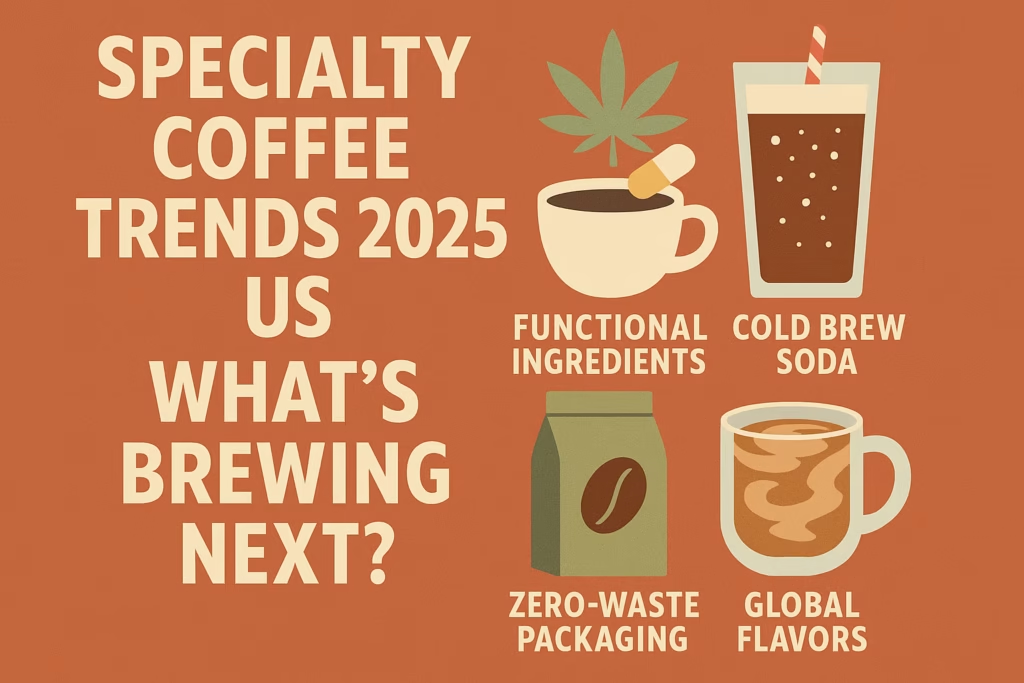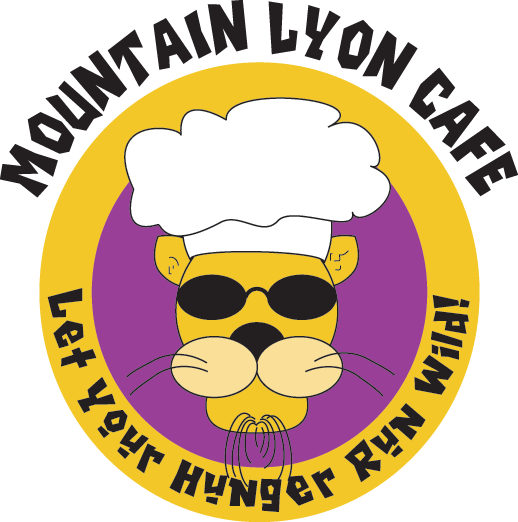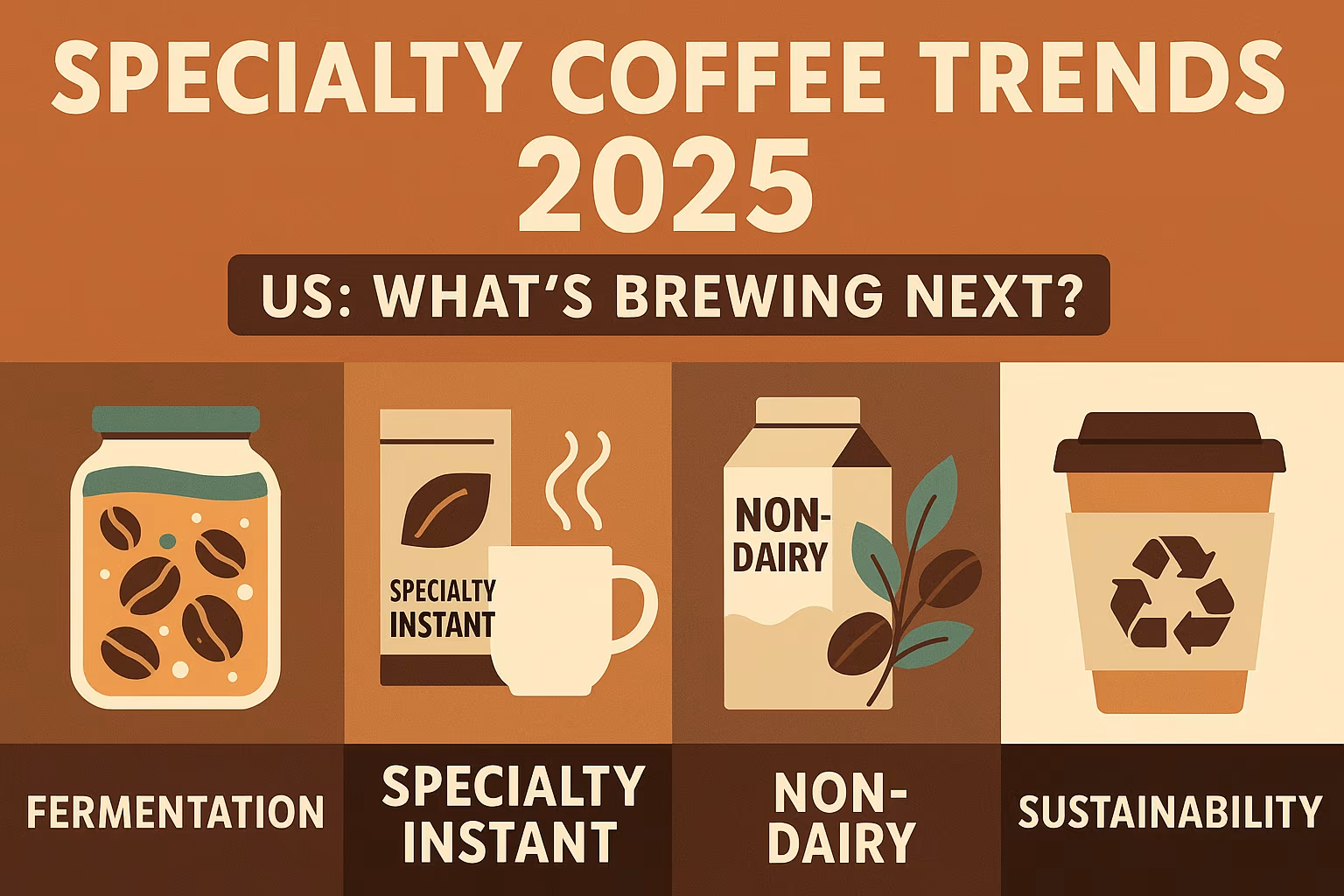Discover the top specialty coffee trends, from health-focused brews and sustainable sourcing to AI-driven personalization. This in-depth guide explores how consumer preferences, technology, and culture are reshaping the coffee industry across America. Stay ahead with insights into the drinks, cafes, and innovations defining the future of specialty coffee.
What’s Brewing Next?
The world of specialty coffee is evolving faster than ever, and is set to be a groundbreaking year for the US coffee market. With shifting consumer habits, rising awareness of sustainability, and a wave of innovative drinks and brewing methods, the industry is experiencing what experts call the “Fourth Wave of Coffee.”
According to the National Coffee Association (NCA), 66% of Americans drink coffee every day, while the Specialty Coffee Association (SCA) highlights that specialty coffee now accounts for nearly half of all daily coffee consumption in the US.
See more: How to Cut Caffeine Without Quitting Coffee: Smart Tips
What Are the Top Specialty Coffee Trends?
The central question driving café owners, roasters, and consumers alike is simple: What will define specialty coffee in the United States?
The answer lies in several interconnected trends health-conscious choices, functional wellness brews, plant-based innovations, sustainable practices, technology-driven personalization, and viral flavors spreading like wildfire on TikTok and Instagram.
Each trend is not just about taste, but about meeting deeper consumer demands: wellness, ethical sourcing, convenience, and community. To illustrate this, consider how Starbucks’ launch of protein cold foam with 15g of protein per serving made headlines across the US wellness community.
Or how quirky drinks like banana bread latte and tahini coffee surged in popularity, with Yelp reporting searches up 6,267% and 900% respectively.

Rise of Health-Conscious Coffee Choices
A defining feature of specialty coffee trends is the strong tilt toward health and functionality. Coffee is no longer just about caffeine; it is about nutrition and wellness.
Drinks like mushroom coffee, infused with lion’s mane or chaga, promise focus and stress relief. Protein-infused coffee is marketed to fitness enthusiasts as a two-in-one solution—pre-workout fuel plus morning boost.
Low-acid coffee appeals to those with sensitive stomachs, a segment that has grown steadily according to Mintel’s consumer reports. As one health expert at UCLA noted in a 2024 wellness conference, “Coffee has become the wellness drink of choice, evolving beyond indulgence to intentional living.”
Examples of trending health-forward coffee:
Protein Cold Foam Lattes (Starbucks nationwide)
Mushroom Coffee Mixes (Four Sigmatic, Rise Brewing Co.)
Collagen Coffee for skin and joint health
Low-acid brews marketed for gut sensitivity
“An apple a day keeps the doctor away” may be an old proverb, many consumers are starting to believe that a mindful cup of coffee does the same.
The Surge of Plant-Based & Dairy Alternatives
Plant-based milks have firmly established themselves as a mainstay in US cafés, oat milk lattes dominate menus, while almond, soy, and even pistachio milk are making appearances.
According to Statista, 39% of Millennials in the US regularly order plant-based lattes, and that number is projected to rise. Vegan coffee is no longer a niche request; it’s a default option in most urban coffee shops.
Specialty roasters are experimenting with nut-based creamers that not only complement flavor notes of Ethiopian and Colombian beans but also align with sustainability goals.
A barista in Portland explained interview with Coffee Talk Magazine: “Customers don’t just want dairy-free, they want milk alternatives that enhance the flavor profile of specialty beans.”
This statement highlights the intersection of taste, health, and ethics, creating a powerful market driver for cafés and roasters alike.
Functional Coffee: From Energy to Wellness
Beyond traditional caffeine, functional coffee is expanding into wellness territory. Adaptogens like ashwagandha, nootropics for focus, and collagen for beauty are becoming mainstream add-ins.
Drinks labeled as functional coffee are being positioned in grocery chains like Whole Foods and Target, signaling mass adoption. These innovations align with a growing consumer base—particularly Gen Z—that sees beverages as tools for self-optimization.
Popular functional coffee categories include:
| Functional Add-In | Benefit | Example Product |
|---|---|---|
| Mushroom extracts | Focus, stress relief | Lion’s Mane Coffee |
| Collagen peptides | Skin & joint health | Collagen Latte |
| Protein powders | Fitness recovery | Protein Cold Brew |
| Nootropics | Cognitive performance | Smart Coffee blends |
Health trends are more than marketing gimmicks; they represent a cultural shift toward intentional living, where every sip is aligned with personal goals.
Gen Z & Millennials Shaping Coffee Culture
Gen Z and Millennials are at the forefront of coffee culture transformation. Unlike Baby Boomers, who see coffee mainly as a morning ritual, younger consumers view it as an identity marker.
Ordering a tahini latte or sharing an affogato video on TikTok is as much about self-expression as it is about taste. Social media data reveals that hashtags like #HomeCafe and #CoffeeTok have billions of views, pushing experimental recipes viral overnight.
A recent New York Times feature on the Home Café Movement noted that Gen Z is turning kitchens into mini coffee labs, complete with latte art kits and pour-over stands. This is more than a hobby, it’s a form of cultural participation, blending aesthetics, taste, and digital storytelling.
Sustainable and Ethical Coffee Innovations
Another critical driver shaping specialty coffee trends is sustainability. As climate change continues to disrupt supply chains and drive up prices, consumers are becoming more aware of the story behind their cup.
According to a 2024 McKinsey report, 72% of US coffee consumers consider sustainability when purchasing coffee, and this awareness directly influences their brand loyalty.
Eco-Friendly Packaging and Pods
Cafés and roasters are racing to adopt eco-friendly packaging solutions: biodegradable coffee pods, compostable cups, and recyclable bags. Brands like Nespresso are marketing their new compostable pods as part of a “green revolution.”
Specialty shops in San Francisco and Seattle are piloting bring-your-own-cup discounts, making sustainability both a financial and ethical choice.
Direct Trade & Transparency Movement
The direct trade movement is gaining traction, where roasters establish relationships directly with farmers to ensure fair prices and quality. Labels such as “Fair Trade” and “Direct from Origin” are no longer optional; they are expected by discerning specialty coffee consumers.
This trend reflects a larger cultural move toward transparency and authenticity—values that resonate deeply with Millennials and Gen Z.
In the words of Peter Giuliano, Chief Research Officer at the Specialty Coffee Association: “Transparency is no longer a marketing tool; it’s a requirement. Consumers demand to know the journey of their coffee, from farm to cup.”
Technology Transforming Specialty Coffee
No discussion of specialty coffee trends would be complete without highlighting the role of technology. From artificial intelligence to robotic baristas, innovation is brewing at every corner.
What once felt like science fiction—machines that recommend a personalized coffee blend based on your biometric data—is now becoming reality.
Companies in Silicon Valley are partnering with specialty roasters to create AI-powered coffee personalization platforms that analyze a user’s taste preferences and suggest optimal beans, roast levels, and brewing methods.
AI-Powered Coffee Recommendations
The rise of AI personalization in coffee mirrors the recommendation systems used by Netflix or Spotify. Imagine walking into a café, scanning a QR code, and receiving a suggested drink tailored to your mood, sleep quality, or even your fitness goals.
This is already happening in pilot programs in San Francisco and New York, where AI recommends functional coffee blends for stress reduction or energy boosts.
At Lyoncafe, our experts have been studying these systems closely, and through our practice with industry partners (learn more at mtnlyoncafe.com), we believe AI will not replace baristas but will empower them to deliver a more meaningful, personalized customer experience.
Smart Machines & Robotic Baristas
The introduction of robotic baristas has sparked debate across the US coffee industry. Cafés in Los Angeles and Las Vegas are testing fully automated kiosks that can prepare 200 drinks per hour with precise consistency.
Proponents argue this enhances efficiency, reduces labor shortages, and guarantees consistency; critics counter that it removes the human artistry of coffee-making.
The middle ground seems to be hybrid cafés where automation handles repetitive tasks (grinding, steaming) while human baristas focus on creativity and customer connection. As one café owner in Seattle noted: “Technology should support the ritual of coffee, not strip it away.”
Flavor Innovations and Viral Coffee Drinks
Seasonal Hits: Pumpkin Spice Latte & Beyond
The Pumpkin Cream Cold Brew and variations like apple crisp macchiatos remain staples, but younger consumers demand innovation. According to Starbucks’ quarterly report, seasonal drink launches now account for nearly 20% of annual beverage sales, a testament to how powerful seasonal hype can be in shaping consumer choices.
Viral TikTok & Instagram Coffee Trends
Perhaps the most fascinating development in specialty coffee trends is the sheer influence of social media. Drinks like the Banana Bread Latte (searches up +6,267% on Yelp) and Tahini Coffee (+900% search increase) have exploded thanks to TikTok.
The Fluffy Seagull Latte, with its marshmallow fluff base, has become a summer sensation in Cape Cod, proving that sometimes the quirkiest ideas generate the loudest buzz. Viral content fuels café traffic and consumer experimentation at home, reinforcing the growing Home Café Movement among Gen Z.
As an old proverb says, “Curiosity killed the cat, but satisfaction brought it back.” This perfectly describes why Americans are flocking to try the newest latte trend—they are curious explorers of flavor, seeking satisfaction in novelty.
Coffee Shops: The New Experience
Beyond the beverage itself, the coffee shop experience is undergoing a radical transformation.
Third-Wave Coffee Shop Design Trends
Third-wave coffee culture has always emphasized quality and craftsmanship, but it also prioritizes ambience and experience. Shops are becoming multifunctional spaces—cafés by day, co-working hubs by afternoon, and cultural venues by evening.
In Austin, new cafés feature rotating art exhibits, while in Chicago, cafés double as vinyl record lounges. Consumers no longer want just a drink; they want an environment where coffee becomes the anchor for community, creativity, and lifestyle.
Home Café Movement Among Gen Z
Parallel to café evolution is the rise of the home café. With coffee equipment more accessible than ever—affordable espresso machines, pour-over kits, and milk frothers—Gen Z has transformed their kitchens into aesthetic coffee labs.
TikTok’s #HomeCafe hashtag has surpassed billions of views, showcasing everything from latte art challenges to DIY functional coffee recipes.
This democratization of specialty coffee means that knowledge once confined to baristas is now shared freely across social platforms. At Lyoncafe, we see this as a sign of a healthy ecosystem: cafés inspire, consumers replicate at home, and the cycle of innovation continues.
Challenges: Inflation, Supply Chain, Climate
However, challenges remain significant. Coffee prices are rising due to climate change impacts in Brazil and Colombia, two of the world’s largest producers.
Supply chain bottlenecks are increasing costs for small roasters, and inflation is pushing the price of a 12-ounce bag of specialty beans to over $20 in some markets.
Consumers, however, appear willing to absorb these costs, provided the product aligns with their values of quality, sustainability, and wellness.
Conclusion
The story of specialty coffee trends is one of transformation, resilience, and opportunity. Consumers are demanding more than just caffeine—they want wellness, personalization, sustainability, and creativity in every cup. From protein cold foam lattes to banana bread coffee, from robotic baristas to eco-friendly pods, the industry is simultaneously honoring tradition and embracing innovation.

My name is Kara Chavez, and I love coffee. I love making the best coffees – espresso, latte, macchiato. I always strive for perfection in my barista skills, and I take great pride in bringing delicious cups of coffee to my customers.
I’ve been in the coffee industry for many years, and I know everything there is to know about brewing the perfect cup of coffee. My passion for coffee shines through in every cup I make, and I hope you’ll stop by soon so I can share my love of coffee with you!

